 Полная версия
Полная версияHarper's Young People, November 25, 1879

Various
Harper's Young People, November 25, 1879 / An Illustrated Weekly
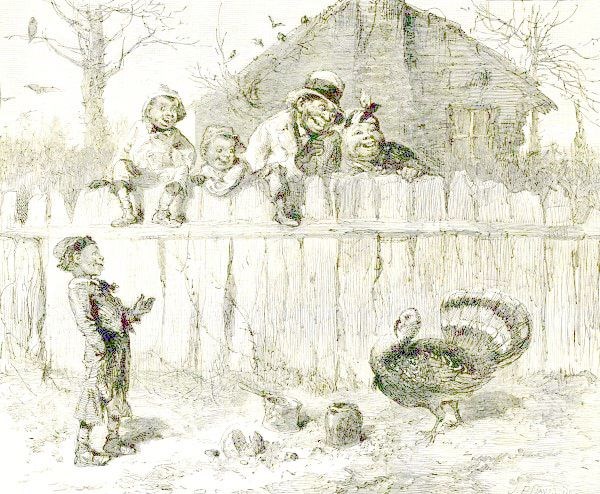
THE DAY BEFORE THANKSGIVING.
"we's stuffed you long 'nuff; got to stuff ourselves to-morrow."
THE BRAVE SWISS BOY
III.—THE CHAMOIS-HUNTERS
Early the next morning the door of the little mountain cottage grated on its hinges, and Mr. Seymour entered the small apartment, eagerly welcomed by Walter, who ran forward to meet him.
"What! you are up already, my boy, and as fresh and lively as if nothing had happened!" said he. "I fully expected to find you knocked up and ill after all the exertion and fatigue of yesterday; but I am glad to see that you are so much stronger than I gave you credit for. How is your back, though, Walter? Don't the wounds made by the vulture's claws pain you very much?"
"They were very sore last night, Sir," replied the boy; "but father bound them up nicely for me, and says they will be much better in a week."
"Delighted to hear it. But where is your father? I don't see him."
"He is outside. Sir, with Liesli, the cow that we recovered through your kindness," replied Walter, with a grateful look. "She is the best cow in the valley."
"Ah, here comes your father," said Mr. Seymour, with a smile, stepping forward to grasp the hand which Toni Hirzel held out toward him, while thanking him in hearty but simple words for the kindness he had shown to his boy.
"Don't mention it, my friend. What I gave to the boy was given very willingly, and he has richly earned not only that, but a few francs more, which I am still owing him. But we will square accounts now. Here, Walter; there is forty francs for the old vulture which you captured so bravely; and here is another sixty francs for the torn trousers and the knife you lost."
With these words Mr. Seymour counted out five bright gold pieces on the table, to the wonderment of Toni Hirzel and his son, neither of whom could utter a word.
"But, Sir," exclaimed Walter, finding his voice at last, "the vulture, the trousers, and the knife all put together are not worth twenty francs!"
"They are worth more to me," replied the gentleman, "and you must allow me to pay for them according to my opinion of their value. So make no more words about it, my boy, but put the money in your pocket. I hope it may prove useful to you."
Tears started into Walter's eyes. "Oh, father!" he exclaimed, "only look at all this money! We shall be able to buy another cow, and make twice as much cheese as we do now. We sha'n't have to borrow anything from Neighbor Frieshardt any more, and if everything goes on well, we shall soon be able to build a house as good as his. It will be a blessing for you to have a comfortable home in your old age."
But Toni Hirzel shook his head. "Don't talk so fast, my boy," said he, quietly. "That is a great deal more money than we can think of taking. Pray take it back, Mr. Seymour. Watty is quite right. Twenty francs will amply suffice, especially when you were so liberal toward him yesterday."
"Very well, friend, so be it," was the reply. "If you won't let me pay you the money as a debt, I hope you will allow me to give it to Walter as a present. I'm sure you won't object to that. He can save it till he's a few years older, if he doesn't require to spend it now; so let the matter drop, unless you really wish to annoy me."
Seeing that Mr. Seymour was in earnest, Toni Hirzel made no further objections, and lifted the money from the table.
"Well, then, Walter, I will take care of this handsome gift for you until you are old enough to make a good use of it," said his father, as he placed the money in a leather pocket-book, which he deposited in a secret drawer of the cupboard. "Rest there quietly," said he, in a whisper; "when I am dead and gone, it will be a nest-egg for Watty to fall back upon."
Mr. Seymour then rose to take his departure: and before saying farewell, Walter asked and obtained leave to visit the friendly traveller soon; but when he went to Rosenlanibad three or four days afterward, he found that Mr. Seymour had received a letter from home, which had compelled him to take his immediate departure.
The summer passed away; autumn came, and stripped the leaves from the trees; the first flakes of snow fluttered in the air; the days were growing shorter, and the quiet and solitary valley took its turn in the changes of fortune which so frequently occur in the outer world. Although Toni Hirzel was sober and industrious, he could not escape the common lot of humanity. He sustained a heavy loss at the beginning of winter in the death of his favorite cow. Soon afterward the severity of the weather drove from the mountains the wolves, which broke into the stable during the night and killed two of his five goats.
These losses were serious to the poor man. The only property he possessed in addition to his cottage consisted of the cow and the goats, which supplied him with the barest necessaries of life; and now he was deprived of them almost at one stroke. It was hard to bear; but by-and-by the recollection of the money which Mr. Seymour had given him came as a ray of sunshine to Walter, who begged his father to take it and buy another cow.
"No, Walter," was his reply. "The money is yours. Mr. Seymour made you a present of it, and it shall remain untouched until you are old enough to spend it for some good purpose. You are too young and inexperienced yet; so don't say any more about it. Now that we have lost Liesli and the goats, we must bestir ourselves to do something else for a living, until the spring, when we may perhaps be fortunate with the chamois. There are plenty of chamois on the hills, and my gun on the wall there has brought down many a fine buck. When spring comes we'll go out together, and you will see that your father has still a firm hand and a sure foot."
The winter wore away by degrees. The warm south wind crept slowly through the valleys, melting the snow from the mountain-sides, and calling into life hundreds of sparkling streams. Waterfalls foamed and thundered; enormous masses of snow came crashing down from the mountain-peaks; while amid the noise and thunder of avalanches the sun exercised its silent but mighty influence, renewing the mountain greenery, converting the barren ground into a verdant carpet. The birds returned from their winter home, and again burst into joyous song; and again the budding trees proclaimed that winter was over and gone.
During the dreary winter-time the simple wants of the two mountaineers had been supplied by much toil and much privation, so that the return of the vernal season was hailed with joyful acclamation.
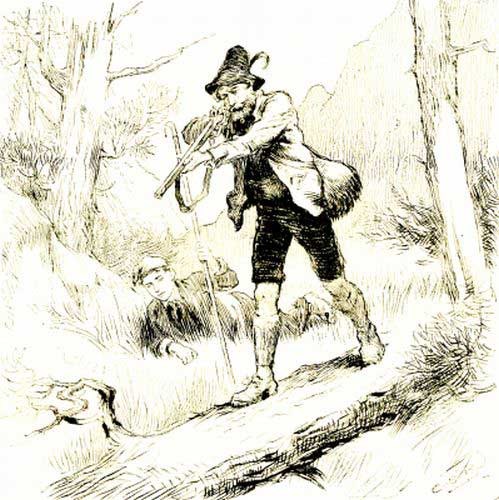
WATTY AND HIS FATHER HUNTING.
"It is time for us to be off now," said the hunter one morning to his boy; and day after day, whenever the weather was favorable, they might have been seen climbing the lofty mountain ranges in search of game, sometimes not returning to their little cottage for several days. At other times, however, after unspeakable trouble and danger, they would return home in great glee, the father bearing a large chamois slung across his shoulders, to be sold for a good price to the landlord of the inn.
Toni was looked upon by all the country round as the best hunter in the district, and he was determined to maintain his reputation. By the end of August, when the summer was approaching its end, he had shot thirty chamois, and the best of the season was still before him.
"Now, Watty," said he, "we must look out for the winter. We have got on famously through the fine weather, and have made a little money; but there's not enough yet for what we require, and we must work away for some time still before we get as much as will replenish our empty byre."
"I will do all I can to help you, father," replied the boy. "I saw a track on the Wellhorn yesterday that promises a finer buck than we have taken yet."
"On the Wellhorn! On which side?"
"On the glacier side, father. It is not so very difficult to get up there; but I noticed that whenever he was disturbed, the chamois went across the glacier toward the Engelhorn, and I am afraid it would be rather dangerous to follow him. There are cracks in the ice hundreds of feet deep, and how well we know that whoever falls into one of them would never see the light of day again."
"That is very true," said his father, thoughtfully. "But we must have the buck at any risk. Do you know the spot on the glacier where he makes for the Engelhorn?"
"Yes; it is quite at the top, where the ice is spread out like a sea."
"Well, then," said the experienced mountaineer, "we must try and avoid following the chamois over the ice, and rather wait for him on the Engelhorn, and get a shot at him as he passes. You must go to the Wellhorn, my boy, and drive him toward me."
"Yes; that will be the best, father," replied Walter. "I thought of that myself."
"Well, then, let it be so. We must be off before daybreak to-morrow morning."
Toni made the necessary preparations the same evening, and long before the first beams of Sol were visible on the following morning, he left the cottage with his son. After a toilsome ascent of half an hour, they separated. The father turned to the left toward the steep and craggy Engelhorn, after he had described the exact point toward which Walter was to drive the animal, while the boy scrambled up the dangerous ridges of the Wellhorn, to find the chamois, and drive it to the place where his father was to lie in wait.
"Be very careful, Watty," said his father to him ere they parted; "don't be reckless or foolhardy."
The boy promised to be watchful, and they separated, each to his own share of the toilsome and perilous undertaking. Taking advantage of the rocks and stones which marked the path of a former glacier, Walter reached the summit of the Wellhorn without much difficulty, after an hour and a half's climb. Taking a small telescope from his pocket, he peered anxiously across the field of ice which separated him from the Engelhorn, and descried his father working his way cautiously along the edge of the glacier till he gained a part of the rocks that seemed to afford a possibility of climbing. He then had the satisfaction of seeing him sit down to rest.
"He has got just to the right spot," said he to himself. "He must have seen the track. It is just fifty feet from there that the chamois springs across a crack in the ice to get to the pasture higher up; and when he once gets sight of him, father won't let him escape. But, first and foremost, I must find the game, and start it across."
No sooner said than done. Clambering from rock to rook, always observant and watchful, the resolute youth pursued his way. Suddenly, however, he stood still, and threw himself flat on the ground.
"I thought so—there he is!" said he to himself. "I must work my way carefully round to the right, and then frighten him off with a shout."
Taking stealthy advantage of every rock that could screen him from observation, Walter raised his head now and then to make sure that the chamois had not taken fright and removed from the spot. When he had thus reached the right position, he started to his feet and uttered a loud halloo! With a bound the chamois sprang down to the field of ice, which it crossed with light and rapid strides.
"The game is ours!" exclaimed Walter, with delight. But his joy was premature. Now began a chase, which lasted nearly an hour, until the animal approached the spot where Walter's father lay, when it suddenly stopped, gave a tremendous spring to the right, fled across the glacier with the speed of an arrow, and was out of sight in an instant.
"He must have seen father, or else scented him," said Walter to himself. "Our trouble is all in vain for to-day, so I must go acquaint father with the result."
A few minutes brought the lad to where his father was awaiting the appearance of the buck; but Walter saw at once that the older sportsman was aware of what had happened. His father beckoned to him to be silent, and pointed to a small green spot above the steep sides of the Engelhorn. Turning his eyes in that direction, Walter recognized the chamois standing on the scrap of meadow.
"Now we've got him," whispered his father. "He can't take the steep sides of the mountain, and we've cut off his retreat; so come along, my boy, as fast as you can."
Moving hurriedly over the ice, they soon reached a point from which they could get a good view of the chamois. Unfortunately, however, a large chasm in the ice lay right before them, and stopped their progress. The chamois had cleared it, but it was quite beyond human strength and agility.
[to be continued.]SEA-CUCUMBERS
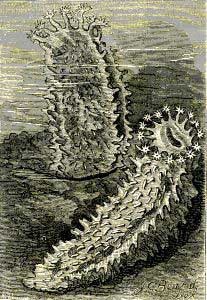
SEA-CUCUMBERS.
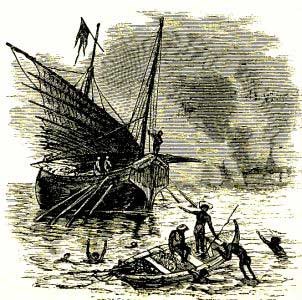
GATHERING SEA-CUCUMBERS.
Toward the end of October of every year there is a harvest of cucumbers in mid-ocean. These cucumbers, however, are not at all like those we see on our tables. In the first place, they are not vegetables, but animals, and, in the second place they grow upon the bottom of the sea. The general appearance of the creature can be seen in the accompanying cut. There are many species, but they all possess elongated worm-like bodies, with thick leathery skins, and a crown of feelers, or tentacles, about the forward extremity. All species, likewise, exercise the same astonishing method of resenting any liberties taken with their persons, by suddenly and unexpectedly ejecting their teeth, their stomach, their digestive apparatus—in fact all their insides, so to speak—in the face of the intruder, reducing themselves to a state of collapse, and making of themselves mere empty bags, until such time as their wonderful recuperative powers enable them to replace the organs so summarily disposed of; for, wonderful as it may seem, teeth, stomach, digestive organs, and all soon grow again. Moreover, these stomachs have digestive powers that are not to be despised, far surpassing even those popularly ascribed to the ostrich, for the sea-cucumber actually seems to feed upon coral, and even granite has been found in its stomach.
Sea-cucumbers, as they are popularly called, are also known by the name of trepang and sea-slug. Scientific people call them Holothuroideæ, but why, no one has ever been able to find out, since the name has no meaning. Sea-cucumbers are considered a great delicacy by the Chinese. Thousands of Chinese vessels, called junks, are fitted out every year for these fisheries. Trepangs are caught in different ways. Sometimes the patient fishermen lie along the fore-part of vessels, and with long slender bamboos, terminating in sharp hooks, gather in sea-cucumbers from the bottom of the sea, so practiced in hand and eye that the catch is never missed, and is discerned sometimes at thirty yards' distance. When the water is not more than four or five fathoms deep, divers are sent down to gather these culinary monsters, as seen in the illustration, the boat and junk remaining near to receive the harvest.
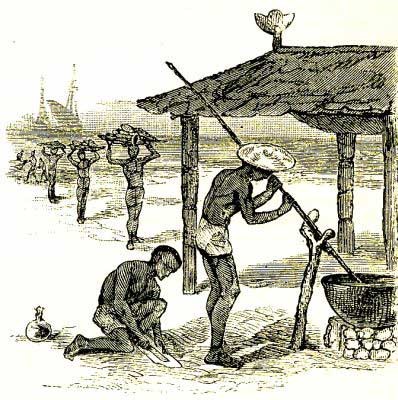
THE PROCESS OF SCALDING.
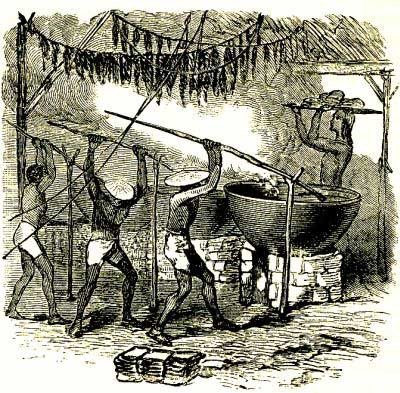
BOILING AND CURING.
As soon as the trepangs are collected they are carried to the shore, when they are scalded by throwing them alive into large iron pots set over little ovens built of stones. Here they are stirred about by means of a long pole resting upon a forked stick, as seen in the illustration. In these vessels they remain a couple of minutes, when they are taken out, disemboweled with a sharp knife, if they haven't already thrown up their stomachs, and then taken to great bamboo sheds containing still larger boilers. In these latter is water seasoned with mimosa bark. A busy scene now ensues; all is bustle, noise, and activity. The bubbling of the great caldrons, the incessant chatter of those engaged in the work, the dumping of fresh loads of sea-cucumbers into the vessels, and the removal of others to hang in clusters on the ropes above, or be deposited on hurdles to dry in the sun, make "confusion worse confounded," and give the spectator a new and realizing sense of the confusion of tongues at the Tower of Babel.
The sea-cucumbers having been smoked in the large caldrons (for the mimosa bark is consumed in the process), and then dried, are ready for the market, and, packed in bundles, are stowed away in the holds of the junks and proas off shore.
They are said to taste like lobsters; but if they look, as one traveller says they do, "like dried sausages rolled in mud and thrown up the chimney," few of us could be induced to try whether we liked them or not.
BENJAMIN FRANKLIN
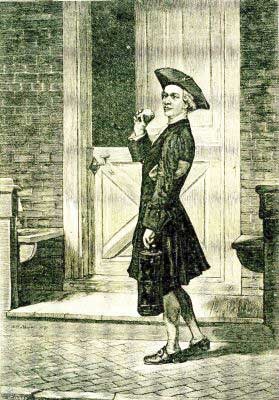
FRANKLIN AND HIS LOAF OF BREAD.
Benjamin Franklin, born in Boston in 1706, when a boy laid down certain rules of conduct which he always followed. He made up his mind to be temperate, orderly, frugal, and industrious. When ten years old, he cut wicks for candles, minded the shop, and ran errands for his father, who was a tallow-chandler. He did not, however, neglect his books, for he tells us, "I do not remember when I could not read." Though no boy ever worked harder, he was fond of manly sports, and was an expert swimmer. Not liking the tallow-chandlery business, his father apprenticed him to a printer. This was precisely the kind of work which suited Franklin. When hardly eighteen years old, he was sent to England to buy printing material, and to improve himself in his trade. As a printer in London, a very young man, entirely his own master, with no friends to control him, surrounded by temptations, those rules which he had fixed upon early in life were of singular benefit to him. Returning to America in 1726, in time he opened a modest printing-house in Philadelphia. Industry, honesty, and good work made him successful. He became member of the Assembly, Postmaster, and during the Revolution, while in France, induced that country to espouse our cause. If to-day the world has to thank Americans for making electricity their servant, Benjamin Franklin first discovered its most marked qualities. With a kite he brought down the spark from heaven to earth, and held it under control. Franklin died, honored by all his countrymen, in 1790.
When a lad, hungry and tired, he landed in Philadelphia with a dollar in his pocket, he bought some bread, and marched through the streets munching his crust. He happened to see a young lady, a Miss Read, at the door of her father's house. He made up his mind then and there that he would marry her; and so in time he did. Strangely enough, that exact part of New York from whence Harper's Young People is issued is called Franklin Square.
MR. AND MRS. MOUSE
Once upon a time there lived a Mr. and Mrs. Mouse. They were sometimes almost tempted to be sorry that they did live, for they were often very short of anything to eat, and it happened once or twice that they were very nearly eaten up by cats, or hunted by dogs, all of which made them very unhappy. They had changed their house over and over again, till they were quite sick of such a wandering life. At last Mr. Mouse said to his wife one day, "My dear, I have made up my mind not to settle down anywhere till I have thoroughly examined the place to see if it will suit, for I am tired of having to change every week like this."
"Very well, dear," said his wife, "I quite agree with you. I am as tired of this moving as you can be. Do you know, I am getting quite thin from all this worry of dogs and cats. I feel quite loose in my coat, and I feel so dreadfully nervous of traps every time I venture out at night into the kitchen."
"Poor little thing!" said Mr. Mouse; "but I think I know of a place that may suit us. The old lady that lives up stairs in her bedroom is a kind old woman, I have heard cook say. Don't you think we might look behind the wainscot of her room, and see if it would suit?"
So they agreed to go up stairs that very night and pay a visit to the old lady's room. The old lady was a great invalid, and hardly ever left her room. Mr. and Mrs. Mouse inspected the whole room carefully, she looking after their lodgings, and he seeing what chances there were of food, and what kinds of it, for Mr. Mouse was rather dainty in his eating, if he were not hard up for food, as they had been a good deal lately. They found everything perfection. As to lodgings, Mrs. Mouse found a hole which delighted her extremely. It was obscurely hid in the wainscot under the wardrobe, where nobody could possibly see them going in and out—just to her liking. With a little nibbling of the wood here and there inside the hole, she thought it would make the most delightful house anybody ever had. There were no nasty draughts to give her colds, and if they wanted a little amusement during the day, there was the whole length of the wardrobe to race along under; for, to tell the truth, Mr. and Mrs. Mouse were both quite young yet, and enjoyed a good scamper immensely. She also found that there had been no other mice for a very long time, if there ever had been. She was very glad of this, as she by no means approved of a lot of other mice being there to interfere with her and her husband. Mr. Mouse was equally pleased with what he found.
The old lady who lived in the room was constantly having all kinds of invalid messes, arrowroot, gruel, etc. There would have been quite enough to eat from what she left alone; but besides all her eatables, there was a large cage full of birds, that spattered their seed about in all directions, and Mr. and Mrs. Mouse were very fond of bird seed. Then there were always bread-crumbs about, and lumps of sugar; in fact, both Mr. and Mrs. Mouse agreed in thinking that there had never been a place so thoroughly fitted for them in every way. So, after examining the room in every corner, and being quite satisfied, they both scampered off down stairs again, and, avoiding the cat, got safely home.
Next day they set about moving, or rather next night, for they did nothing all day but pack up their trunks and rest themselves before the night came on. They worked very hard, and were all but settled in their new home when the morning came.
Then Mrs. Mouse turned her husband out while she arranged the inside of her house. She took great pains about their bedroom, which she filled up with some rose leaves from a "pot-pourri" vase on the landing outside, which made a deliciously soft bed to lie upon. At each corner, to make the posts of the bed, she stuck a clove or bit of cinnamon, and to make the curtains over the top and at the sides she robbed a spider's web, which looked lovely. When she had finished all her arrangements she called Mr. Mouse in, and when she heard his little squeaks and screams of delight, she was fully satisfied. In the mean time he had brushed the floor just outside with his tail till it was quite clean, and on it he had spread their first meal in their new house. And what a good breakfast it was! Bird seed of several kinds, bread-crumbs, a little bit of arrowroot, some lumps of sugar, and as dessert he had with great courage stolen a little piece of chocolate from the old lady's bedside. They were very jolly in their new house; they had never felt so secure anywhere before, and hoped they might now live in peace. After living there some time they found out that the old lady was very fond of all kinds of animals, and the idea of anything being killed was dreadfully painful to her. She was not aware that a cat was kept below stairs, or she would not have allowed it, for she was very fond of mice. Mr. and Mrs. Mouse knew they were perfectly safe with her, but they were not at all as sure of her maid, who looked very cross and grumpy. So things went on for some time very happily, and Mrs. Mouse began to look about for a good place to put her babies in, for she had fifteen of them. She found a large bottle under the wardrobe at one end, and so she told her husband she would put them there. It was not very nice of Mr. Mouse, but he disliked those babies. He thought them hideous, nasty little things, without any hair at all on their bodies, and he thought them horrid for the perpetual squeaking they kept up. He also said that he thought Mrs. Mouse might very well have been satisfied with half the number; but he only said that once, for his wife fired up in a moment, and said he was most unkind, and that he ought to be proud of such a family, for some lady mice had so little pride that they only had six or seven.



